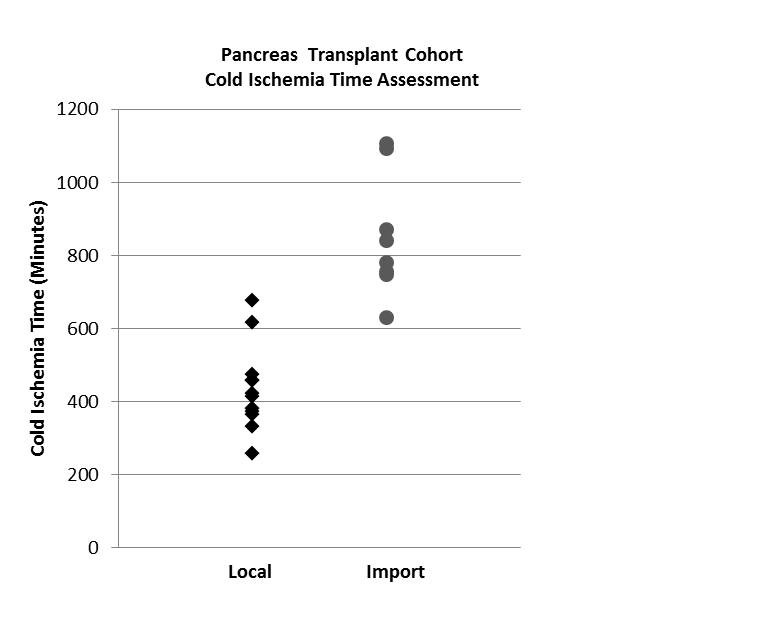Send Diabetes on a Long Trip: The Pancreas Travels Well.
Surgery, Montefiore Medical Center, Bronx, NY
Meeting: 2017 American Transplant Congress
Abstract number: C230
Keywords: Donation, Pancreas, Pancreas transplantation
Session Information
Session Name: Poster Session C: Pancreas and Islet (Auto and Allo) Transplantation
Session Type: Poster Session
Date: Monday, May 1, 2017
Session Time: 6:00pm-7:00pm
 Presentation Time: 6:00pm-7:00pm
Presentation Time: 6:00pm-7:00pm
Location: Hall D1
Pancreas transplantation (PTx) has been on a dramatic decline in the last decade. Numerous factors have contributed to the waning momentum seen in the early 2000's. Certainly this may be due to fewer referrals, however, older and obese donors who suffer from non-traumatic causes of death have diminished the number of suitable donors for pancreas procurement. Our center has looked to redress the latter issue by reversing our policy of only accepting local pancreas allografts. Since 2014, we have performed 8 PTxs from donors in non-regional centers (7 SPKs and 1 PAK) and, 12 PTxs from local allografts (11 SPKs and 1 PAK). There was no difference in the mean donor age (import 21.4 v. local 23.9; p=0.4), mean peak amylase (PA), or mean peak lipase (PL) levels (PA import 271 u/L v. local 204 u/L; p=0.45, PL import 555 u/L v. local 164 u/L; p=0.09). Import pancreata had significantly longer mean cold ischemia times (CIT); (CIT import 853 min v. local 435 min; p=0.0001).  Mean follow-up time for the import and local groups was 481 days and 474 days respectively. The 1-year mean hemoglobin A1c (HgbA1c) was not significantly different in both groups (HgbA1c import 6% v. local 6.4%; p=0.63). The import group had 2 patients with non-occlusive splenic vein thrombosis (SVT). The local group had 1 patient with non-occlusive SVT, 1 patient with gastrointestinal bleeding requiring a re-operation and 1 graft loss due to chronic rejection. Several multivariate analyses have shown that CIT is a risk factor for pancreas allograft failure. Here we show in a highly selective group that import pancreata with longer CITs do not have adverse outcomes when compared to pancreata procured locally. As such, transplant centers faced with declining PTx rates may need to refine their strategy to identify out-of-region donors with favorable characteristics and recalibrate their comfort level as it relates to increased CITs, working with unfamiliar recovering surgeons, and transportation logistics. Notably, these import pancreata contributed to a 66% increase in transplantation rate during this time period.
Mean follow-up time for the import and local groups was 481 days and 474 days respectively. The 1-year mean hemoglobin A1c (HgbA1c) was not significantly different in both groups (HgbA1c import 6% v. local 6.4%; p=0.63). The import group had 2 patients with non-occlusive splenic vein thrombosis (SVT). The local group had 1 patient with non-occlusive SVT, 1 patient with gastrointestinal bleeding requiring a re-operation and 1 graft loss due to chronic rejection. Several multivariate analyses have shown that CIT is a risk factor for pancreas allograft failure. Here we show in a highly selective group that import pancreata with longer CITs do not have adverse outcomes when compared to pancreata procured locally. As such, transplant centers faced with declining PTx rates may need to refine their strategy to identify out-of-region donors with favorable characteristics and recalibrate their comfort level as it relates to increased CITs, working with unfamiliar recovering surgeons, and transportation logistics. Notably, these import pancreata contributed to a 66% increase in transplantation rate during this time period.
CITATION INFORMATION: Graham J, Lubetzky M, Chokechanachaisakul A, Kinkhabwala M, Rocca J. Send Diabetes on a Long Trip: The Pancreas Travels Well. Am J Transplant. 2017;17 (suppl 3).
To cite this abstract in AMA style:
Graham J, Lubetzky M, Chokechanachaisakul A, Kinkhabwala M, Rocca J. Send Diabetes on a Long Trip: The Pancreas Travels Well. [abstract]. Am J Transplant. 2017; 17 (suppl 3). https://atcmeetingabstracts.com/abstract/send-diabetes-on-a-long-trip-the-pancreas-travels-well/. Accessed February 14, 2026.« Back to 2017 American Transplant Congress
